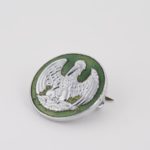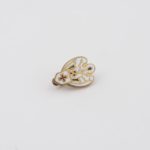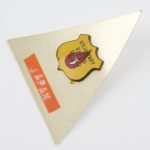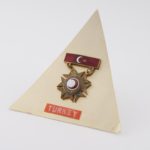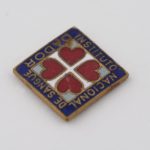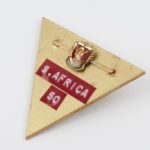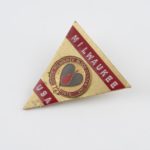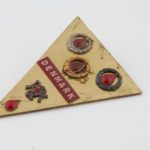
In Ancient Greece, it was thought the gods had golden blood. Called Ichor, this ethereal fluid was fabled to have immortal properties, but was toxic to mere mortals.
Then in 1961, a person with “golden blood” was discovered. Called golden because of its rarity and huge scientific significance – rather than its colour – it is the rarest known human blood type. While it may not grant immortal god-like powers, it has significant life-saving qualities that are extraordinary in their own right.

Before we get into the significance of “golden blood”, it is important to understand how the most common blood groups are determined. Blood is made up of red and white blood cells, platelets, and plasma. Red blood cells determine our blood type.
Red blood cells are made of a membrane with antigens (hundreds of thousands, millions of them) attached. These antigens are a mix of different sugars and proteins. It’s the mix of sugar antigens which determines if you have A, B, O blood (the ABO system). Then it’s the protein mix that determines if you have a negative or positive blood type (the Rh system).
The combination makes up your blood type: whether you are A+, A-, B+, B-, AB+, AB-, O+ or O-.

Knowing your blood type is important because not all red blood cell types can be matched up. If you were ever to need a blood transfusion, you would need to receive the correct blood type.
If the proteins in the Rh system pick up foreign antigens in the blood, including those of the “wrong” blood group from a transfusion, your immune system would attack the donor blood cells. It could cause a life-threatening hemolytic transfusion reaction.
This table summarises which blood types can be matched for transfusion:
Blood Type |
Can receive blood transfusion from |
| A+ | A+, A-, O+, O- |
| O+ | O+, O- |
| B+ | B+, B-, O+, O- |
| AB+ | Everyone |
| A- | A-, O- |
| O- | O- |
| B- | B-, O- |
| AB- | AB-, A-, B-, O- |
The ABO / Rh blood systems are deemed most influential in matching blood types for transfusion. However, there are up to 343 types of antigens which can be present (or absent) on the surface of each blood cell, and this means that there are many more blood types within the eight groups we’ve seen so far – it’s a number that keeps increasing as our understanding evolves.
It is thought that combinations of these 343 antigens can create up to 41 blood-groups in total, some of which are very rare.
So you may not just be B+ but could also be positive for some of the other blood systems too, like MNS, Kell and Lewis.

Whilst “golden blood” is still part of the Rh system, it is the rarest known type. It is Rh-null: 61 Rh antigens are absent in it. If you’re Rh negative, you still have some Rh proteins but you have more missing than you have present. If you’re Rh-null, you have none of these antigens at all.
When it comes to transfusions, you receive blood from someone who has the same number, or fewer, antigens than you do. This means that because everyone has more Rh proteins than an Rh-null person, everyone can safely and confidently receive this blood in a transfusion. This is why “golden blood” is lifesaving: in emergencies when blood transfusion is needed but the patient’s rare blood type is not known, it can be given. Rh-null blood can be accepted by anyone with a rare blood type in the Rh system.
“Golden blood” is as rare in reality as it was in ancient Greek mythology: only forty-three people in the world are known to have had this blood type.
Donation is essential for those who have golden blood too as they can only have a blood transplant from others with this blood type. It is a blessing and a curse. You can read more about a “golden blood” donor’s experiences.
“Golden blood” has also been given this name because it has medicinal significance. It has been used in the scientific development of immunoglobulin-based medicines, these medicines prevent Rhesus Disease (also known as haemolytic disease of the foetus and newborn (HDFN).
HDFN is when a mother with Rh negative blood has a foetus with Rh positive blood. The mother’s blood triggers antibodies which react against their foetus. Untreated HDFN can lead to the baby being born with jaundice or even miscarriage.
It was James Harrison’s “golden blood” which led to the discovery of the difference made by immunoglobulin-based products. Taking immunoglobulin-based medicines during pregnancy creates a shield for the baby, so the mother’s blood does not pick up the + factor.
Harrison’s blood specifically allowed for the discovery of a medicine called Anti-D immune globulin, which is made from human blood plasma. Having made 1,000 blood donations, thought to have saved over 2.5 million babies from Rhesus disease (including his own grandchild), Harrison is known as the man with the golden arm.

Being able to receive “golden blood” in a transfusion is made more complicated by differing international rules regarding blood donation transportation.
All types of blood donations need to be stored between 2 and 6 degree C in a special refrigerator, and can only last 35-42 days in storage – it is incredibly difficult to transport donations long distances. During a disaster or emergency, this means many places rely on people being on hand in the area to donate blood. This is incredibly difficult with a blood type so rare as a person with golden blood – they’re hard to find!
Cue a small clinic in Bristol, which is not only a leader in identifying rare blood types, but brokers matches of rare blood donors to those in need. The clinic, the International Blood Group Reference Laboratory (IBGRL), holds a database of donors with rare blood types which enables a global network that identifies and contacts donors with close geography on the behalf of transplant recipients.
So what blood type are you? Find out if you too have god-like, golden blood, by signing up to be an NHS blood donor.
